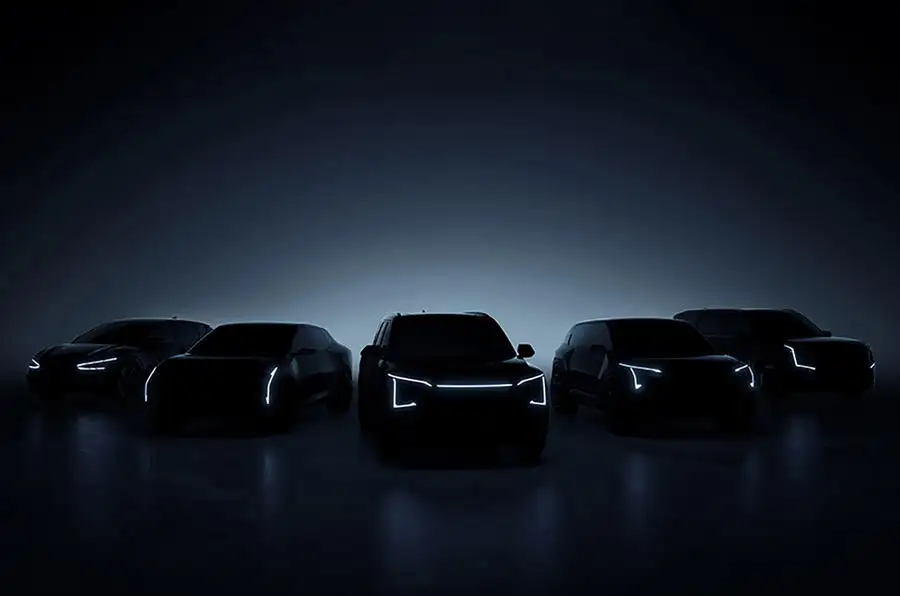Compact crossover and sleek sedan set to join Korean firm’s fast-growing EV line-up.
Kia will reveal two new electric concept cars in the form of a new compact crossover and saloon at an event in Korea next week.
The firm will stage EV Day, the first of a planned annual event to showcase its electric cars and technology, which it says will feature “three new small- to medium-sized electric models”.
This clearly shows the EV6 on the far left and EV9 on the far right, with the new Kia EV5 SUV, which was revealed in August, in the middle.
Kia has said that “detailed specifications” of the EV5 will be given at the event.
The two remaining cars take the form of a sleek sedan and a compact crossover.
The latter is the compact crossover tipped to be called the Kia EV3 that will spied testing recently and will serve as a spiritual successor to the Soul EV.
Less is known about the sedan, although given Kia’s commitment to launching a new model in every major market segment, it would be a natural next step.
The EV Day will also include a strategy update about Kia’s ambitious plans to grow its market share and sales in the electric age.
Kia’s ambitious growth plans for 2030
Kia last year anounced aims to sell 1.2 million EVs globally in 2030 through a major expansion of its EV line-up, the use of enhanced autonomous driving technology and new digital revenue streams.
Those targets build on those announced as part of the Korean brand’s ‘Plan S’ electrification strategy and are broadly in line with ambitions laid out by sibling brand Hyundai. Kia’s overarching goal is to become a “global sustainable mobility leader”.
The brand has four primary targets for 2030: sell 1.2 million battery-electric vehicles, sell four million vehicles overall, roll out advanced connectivity and autonomous driving functionality to all models and become the leading provider of ‘purpose-built’ (ie produced at scale for a specific purpose) vehicles for third-party fleet operators.
The first of these purpose-built vehicles (PBVs) will be derived from existing vehicles, including a larger Kia Niro Plus derivative. After this first wave, the firm will introduce a new bespoke EV platform for PBVs in 2025, which will be fully scalable to suit different applications.
Underpinning Kia’s sales targets will be so-called ‘eco-friendly’ vehicles, which it aims to increase from a 17% sales share to some 52% in 2030. It plans to sell 807,000 EVs per year by 2026 and on to 1.2 million four years later – up 36% on the previously envisioned 2030 target.
In markets where demand for these vehicles is particularly strong (it cites Korea, North America, Europe and China), it aims for electrified vehicles to account for 78% of its global volume.
Kia previously said that its pure-electric line-up will stand at 14 models come 2027, among which it will count two pick-up trucks and an entry-level BEV, presumably positioned as a zero-emission successor to today’s Kia Picanto city car.
Notably, the brand has confirmed that it plans for all future bespoke EVs to follow the Kia EV6 in gaining a GT-badged performance range-topper. It promises that these hot EVs will have “differentiated” designs from their standard counterparts.
Korea will remain Kia’s “global hub for research, development, production and supply of EVs”, but it plans for other global facilities to take the lead for their respective regions.
A European hub, for example, will from 2025 focus on the small and medium-sized EVs popular in that region, while a US site will develop and build mid-sized SUVs and pick-ups from 2024. It will introduce mid-sized EVs in China in 2023, and roll out “entry and mid-sized EVs” in India from 2025.
Like Hyundai, Kia plans to significantly boost its global EV battery production capacity, from 13GWh to 119GWh by 2030. These will come from its Indonesian battery joint venture and various other global battery companies, but it is yet to name any partners in this push.




